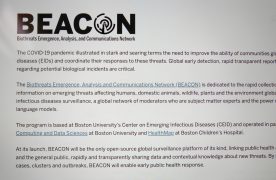Representatives from the Massachusetts Bay Transportation Authority put the brakes on any ideas for a “night owl” service being implemented, and warned that a GPS tracking system for the Green Line meant for use on personal mobile devices was still years away from being realized.
In front of the Student Union on Monday, Green Line Chief Brian Dwyer added that trains would be improved through “a $75 million project in which cars will undergo a selective overhaul in order to install more reliable systems.”
Dwyer laid out ongoing initiatives he said were intended to make transit services in Boston more efficient and widely available to students.
But when Union President and College of Arts and Sciences senior Arthur Emma suggested that students would benefit from an extension of the T’s hours of operation, he was met with a hesitant response from Dwyer.
“We used to provide a “night owl’ service for buses, but discontinued it,” Dwyer said. “The reason we’re not able to run rail service overnight is twofold: one, we can’t afford the cost involved in that right now and two, given the age of our infrastructure, the tracks and various [information systems] require maintenance on a nightly basis.”
Josh Robin, a representative who spoke on behalf of MBTA General Manager Richard Davey, said the MBTA, “has been really focused on improving customer service and innovation.”
He described the MBTA’s most recent effort, which aims to make tracking vehicles more efficient.
Over the past few months, he said, GPS devices have been installed in all MBTA buses, allowing riders to determine exact arrival times.
“We put the data out there, and [software developers] built applications for a number of different devices to tell you where the buses are and when they’re going to show up,” Robin said.
Robin said the MBTA has begun expanding the GPS service to Red, Orange and Blue Line trains, but added that the Green Line is several years away from being equipped with a tracking system that could sufficiently provide the service to stops on BU’s campus.
Dwyer acknowledged that the MBTA rail system is aging but stressed that services are expanding and quality is improving.
“We have established a light rail improvement committee focused on vehicle liability,” he said.
Union spokeswoman Lauren Weil, a College of Communication sophomore, said Union appreciated the visit, explaining that all BU students have a stake in the quality of the MBTA’s services.
“Students take the Green Line and the bus every day,” she said. “Using public transportation in Boston is something that’s an inherent part of being a BU student, and we realize that a lot of students have problems with it. It’s important to us to have MBTA representatives come talk to us about what they’re doing to make students’ lives easier.”
Weil added that she takes comfort in the MBTA’s open solicitude to customer concerns and suggestions.
“A lot of people just don’t know about the efforts they’re making and the ways we can take advantage of such efforts,” she said. “It’s good to know that they are trying to help students.”
This is an account occasionally used by the Daily Free Press editors to post archived posts from previous iterations of the site or otherwise for special circumstance publications. See authorship info on the byline at the top of the page.












